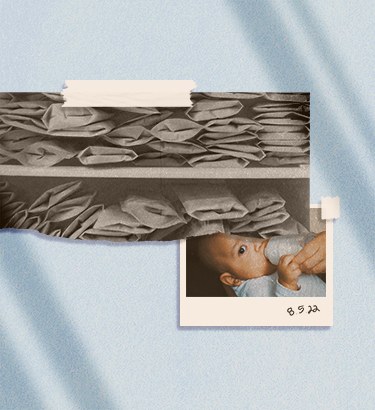Breastfeeding is something many parents struggle with, especially in the early days, so it's vital for new moms to know what can affect milk production. From managing your stress to eating a healthy diet, there are various things you can do to help create a successful breast milk supply for your baby. We spoke to experts about what they recommend.


Human breast milk is composed of 87 percent water, so hydration is essential. "The amount of fluid you intake directly relates to how much breast milk you can produce," said Marie Burke, a mother and baby expert at O'Flynn Medical in London. "Always sip on a bottle of water throughout the day and drink one glass of it every time you nurse."
This agrees with conventional wisdom in the parenting world, however, scientists haven't discovered supporting evidence to back the claim. A 2014 Cochrane Library review of the existing research noted there is a dearth of quality data on the subject and "there is not enough evidence to support an increased fluid intake beyond what breastfeeding mothers are likely to require to meet their physiological needs."
That said, doctors do still advise having water at the ready because when you're nursing, it's all too common to ignore your own physiological needs since you're so focused on tending to the needs of your newborn.
During breastfeeding, the "lactating breast uses 30 percent of the mother's daily energy requirements and has a higher energy requirement than the brain," according to the Clinician's Guide to Breastfeeding.
Because of this, eating enough of the right foods is important. "If you're breast/bodyfeeding, you'll need about 500 extra calories a day," said Mandy Major, PCD (DONA), a certified doula and Philips Avent spokesperson in New Haven, Connecticut. "It's important to eat quality calories and healthy fats to sustain your energy and make milk."
The clinical resource tool UpToDate clarifies these additional energy needs are "330 calories per day more than women who are not breastfeeding. This number factors in the gradual loss of weight gained during pregnancy. The energy required for breast milk production is approximately 500 calories per day, 170 of which come from your body as you gradually lose weight in the months after giving birth (500 minus 170 = 330 calories per day). This recommendation assumes that your baby gets only breast milk and no formula or solid foods."
While diet is important, Burke explained, it doesn't have to be perfect. "Breast milk is actually a living, evolving substance that locks in with what a baby needs during every feed," Burke said. "[This milk is] packed full of essential nutrients and other factors that cannot really be replicated, yet nature is very forgiving, so a bad diet in itself does not directly influence your supply."
Breast milk is made up of many components, and several vitamins are present within that mix, including vitamins A, B6, B12, C, D, E, K, folate (folic acid), iron, thiamin (B1), riboflavin (B2), niacin (B3) and pantothenic acid (B5). This means eating foods rich in these vitamins and minerals or taking supplements can ensure the nursing parent's own reserves are not depleted by feeding.
Some people believe including certain foods in the diet of a lactating parent can boost supply. "Most foods suggested to nursing mothers to improve supply are anecdotal and not scientific, however, many mothers swear by lactation cookies," said Jessica DeGore, RD, LDN, CDCES, CHWC, a Pittsburgh-based anti-diet nutritionist.
"There are certain foods, called galactagogues, which studies have shown to have a small positive impact on supply. They include ingredients like oats, brewer's yeast, leafy greens and chickpeas," Major said. "Involving those ingredients in your postpartum diet is great and they may be helpful, but it's not a golden ticket to making milk."
While it is almost impossible to avoid during those roller-coaster first days and weeks of adjusting to life with a newborn, anxiety and stress can have an indirect impact on breastfeeding supply. "During this period, a mother's body has gone through a particularly tumultuous time. Schedule adjustments and a lack of sleep can cause a fluctuation in the levels of certain hormones, like cortisol, which can severely reduce supply," Burke said.
Specifically, "maternal stress seems to interfere with the release of oxytocin, the hormone that is responsible for the milk ejection reflex," researchers explained in a 2001 study published in the Journal of Nutrition. "If the milk ejection reflex is impaired often, the resulting incomplete removal of milk from the breast eventually will lead to downregulation of milk synthesis."
It's important for overwhelmed birthing parents to ask for help, as excessive worry coupled with breastfeeding problems can put them at risk for postpartum depression. This is when a support network of family and friends or the other parent can step in to help around the house or look after the baby for a few hours. Major stressed the importance of support: "You need someone in your corner to cheer you on, as nursing and pumping is a labor of love!"
"Rest and recovery are essential to ensure you have a steady supply of milk for your baby," Burke added.
Alcohol consumption can also affect your supply, but one small glass of wine to celebrate the birth of your child after nine months of abstinence, and then in moderation while breastfeeding, is most likely fine, especially if timed correctly.
"Casual use of alcohol, such as one glass of wine or beer per day, is unlikely to cause supply problems if the mother waits for around two and a half hours per drink before nursing," DeGore said.
An increased intake can start to negatively affect milk production until the alcohol leaves the bloodstream. "Alcohol can somewhat affect the balance of the hormones oxytocin and prolactin that regulate the production of breast milk, so if you consume a significant amount of alcohol, it can really hinder your overall output," Burke said.
If you have supply issues and ongoing health conditions, then your medication may have a part to play. "Medications may affect supply. Always work with your primary provider for a personalized plan of action," Major said. She advised researching drug effects on LactMed, a free source of published studies on lactation and medication, or call MotherToBaby's free and confidential information line on exposures during pregnancy at 866-626-6847.
Even though there are several factors that can affect breast milk production, following certain guidelines can put you in a better position for establishing and maintaining a healthy supply for your baby. Major recommends regularly timed feedings and/or pumping sessions, a quality latch, skin-to-skin with baby, minimizing stress, eating enough food and drinking enough water.
One point is certain: Getting as much of the love hormone (oxytocin) flowing through your body as possible is important, so spending relaxed time holding your baby and watching them sleep can really help with milk let-down. This time will become a memory you treasure once your child grows up and these hazy breastfeeding days come to an end.












